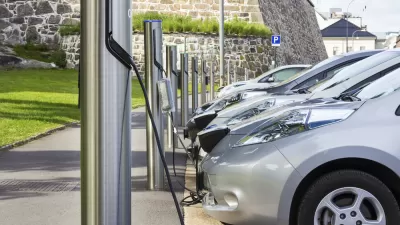Critics question the wisdom of giving Georgia's largest-ever incentive package to electric car manufacturer Rivian to secure a new factory and job training center in East Atlanta.

In what is said to be the largest incentive package ever offered by the state, Georgia has put together a massive set of tax breaks, abatements, and infrastructure improvements to lure electric vehicle manufacturer Rivian to Atlanta. Among other perks, the package includes a "mega tax credit" of $5,250 per job created and financing for a Quick Start training and recruitment facility. The facility will be built at the East Atlanta Mega Site an hour east of the city, where plans are underway to widen roads in anticipation of increased traffic to the factory.
As reported by Greg Bluestein, the package, which will be formally released in a few weeks, has drawn criticism from some who want to see more transparency in how the state secures factories and other facilities. Georgia State University professor Dan Immergluck "cautioned that Georgia is making a substantial wager, too, on a firm that is still awash in red ink and facing production glitches and fierce competition." The state's economic development commissioner, Pat Wilson, expressed optimism, noting that "the tax credits typically include a clawback mechanism that allows Georgia to seek repayment if Rivian doesn’t substantially meet its promises," which include the creation of 7,500 local jobs.
FULL STORY: Georgia’s incentive package for $5B Rivian plant likely largest-ever

Maui's Vacation Rental Debate Turns Ugly
Verbal attacks, misinformation campaigns and fistfights plague a high-stakes debate to convert thousands of vacation rentals into long-term housing.

Planetizen Federal Action Tracker
A weekly monitor of how Trump’s orders and actions are impacting planners and planning in America.

In Urban Planning, AI Prompting Could be the New Design Thinking
Creativity has long been key to great urban design. What if we see AI as our new creative partner?

King County Supportive Housing Program Offers Hope for Unhoused Residents
The county is taking a ‘Housing First’ approach that prioritizes getting people into housing, then offering wraparound supportive services.

Researchers Use AI to Get Clearer Picture of US Housing
Analysts are using artificial intelligence to supercharge their research by allowing them to comb through data faster. Though these AI tools can be error prone, they save time and housing researchers are optimistic about the future.

Making Shared Micromobility More Inclusive
Cities and shared mobility system operators can do more to include people with disabilities in planning and operations, per a new report.
Urban Design for Planners 1: Software Tools
This six-course series explores essential urban design concepts using open source software and equips planners with the tools they need to participate fully in the urban design process.
Planning for Universal Design
Learn the tools for implementing Universal Design in planning regulations.
planning NEXT
Appalachian Highlands Housing Partners
Gallatin County Department of Planning & Community Development
Mpact (founded as Rail~Volution)
City of Camden Redevelopment Agency
City of Astoria
City of Portland
City of Laramie





























